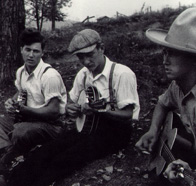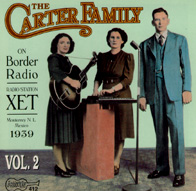![]()
Kevrave
Productions
|
Visit the Rootin' Around Bookstore! Find and order books and CDs about rootin' tootin' music, roadtrips, history and other wacky stuff... |
Many moons ago, I got paid a pathetic hourly camp counselor's wage (plus some sweaty pimento loaf sandwiches) to hunker down in the dirt under a big old shade tree and teach a bunch of spastic little kids how to write folk songs and turn toilet paper rolls into kazoos.
Like most rewarding roots music experiences, this one impelled me to obtain an utterly un-employable degree in American history. After graduating, I sent gobs of letters off to every Endowment for the Humanities, cultural center and museum within sight, hoping someone would pay me to troll around in the dim caverns of the American past. I never got the dream job, but I did get to fill out a 20-page application for a travel planning assistant spot at the Archive of Folk Culture.
This unheralded, but essential division of the Library of Congress is impressively unassuming -- a dusty, modest little library where boxes of Americana (containing stacks upon stacks of old field recordings, photos, films and pamphlets) laze about in apparent repose, pried opened now and then by a whimsical folklorist or roots music fanatic like that wild-eyed banjo dancer, D.C. musician, Stephen Wade (who sported a beatific Willy Wonka grin when I stumbled upon him one muggy summer afternoon in '94 in the Archive's narrow, quiet stacks).
I like to think I caught Wade in the act, as he sifted through the thousands of Presto disc recordings waxed by the Lomaxes and other Library of Congress field engineers as they traveled the American backroads, towns and villages from 1933 to 1946, capturing everything weird, original and home-spun they could in a race against TV, the interstates and the Cold War.
In a Treasury of Library of Congress Field Recordings (Rounder), Wade has lovingly assembled an awe-inspiring cross-section of early 20th century America, using only 30 tracks to paint a portrait of a hard-working, multicultural place of good times and bad times, laughter and sorrow, love and loss. Think of this as the public domain companion piece to the recently reissued Anthology of American Folk Music (which mines the forgotten commercial recordings of amateur folklorist Harry Smith's own 78 collection).

Though many of the performances are raw-boned and rough around the edges, there's a beauty and subtlety rarely found in less carefully compiled collections. W.H. Stepp's "Bonaparte's Retreat" is as fluid and elegant as any piece of fiddling ever waxed by Bob Wills.
Most strikingly beautiful are the CD's a cappella performances, like a sweet-voiced Native American woman's "Creek Lullaby," Irish miner John Quinn's gut-wrenching "Avondale Mine Disaster" and the lilting harmonies of "Sept ans sur mer," by three young Cajun sisters. More proof that some of the best American music ever made was (and still is) fashioned right in our own backyards, back-alleys and back-room taverns and coffeehouses.
Acoustic guitarist John Fahey has always been in perfect alignment with these sentiments. But he's only recently taken his massive collection of obscure early American recordings public, as part of his new record label's imaginatively packaged reissues of primeval American blues, gospel, string-band and early country music.
All the critics in criticland are abuzz over Dock Boggs's Country Blues (Revenant), an impeccably restored set of gangly, haunting banjo laments and parlor tunes laid down by a mountain Virginia miner whose appearance on one cut on Smith's 1952 Anthology transformed Boggs into a folk revival cult figure the likes of eerie bluesman Skip James.
The title track, "Sugar Baby" and "Pretty Polly" showcase a stark, stinging blend of white mountain banjo and railyard black blues vocals, spit out by the wayward, violent Boggs during his brief fling with show biz in the late '20s. The extensive liner notes by Mystery Train author Greil Marcus and the more subdued Jon Pankake paint an exhaustive portrait of a hard-working, troubled Boggs, who subdued his inner demons after he made these recordings and lived out a pretty ordinary life until those pesky Ivy League Yankees "discovered" him and lured him out of retirement in the early '60s.
It's a beautiful reissue and an important piece of musical history, but I must confess to getting a lot more listening enjoyment out of Revenant's more unsung release, American Primitive Vol. 1. After making some quizzical sense of Fahey's inspired liner notes, I was treated to 26 tracks of some of the heartiest, most heartfelt black gospel I've ever heard on record.
The cast of mostly unknowns from the '20s and '30s includes some strangely melodic appearances by husky-voiced bluesman Charlie Patton (under the assumed name of Elder J.J. Hadley).
But the best stuff can be found in the syncopated, guitar-driven harmonies of Blind Roosevelt Graves and Brother ("Woke Up This Morning With My Mind on Jesus" and "I'll Be Rested (When the Roll Is Called)"), The Rev. J.B. Ware With Wife and Son ("You Better Quit Drinking Shine" and "I Wouldn't Mind Dying (But I Gotta Go by Myself)") and the Elder Otis Jones & Congregation's roof-rocking "Holy Mountain." One more reason to get up every morning and do something simple but sanctified.
Country singer Merle Haggard grew up in the gospel way, and has always evinced a deep respect for the shape-note hymnal roots of country music. The recently reissued The Land of Many Churches (Razor & Tie) culls segments from four separate Haggard church and mission performances, with results as mixed as the settings.
The Hag is at his best back at his old stomping grounds of San Quentin, where his soulful "Amazing Grace" goes head-to-head with the male prison choir's twangy, joyous "Old-Time Religion" medley. Despite the presence of talented guests like the Carter Family and Hag's former wife, Bonnie Owens, the remainder of the cuts are sincere, but not very engaging nods to the old standards, with very little of the soul we have come to expect from this dignified, pensive man.
A better place to catch the Carter Family and Haggard's roots in action is The Carter Family on Border Radio, 1939: Vol. 2 (Arhoolie).
When their commercial recording career began to peter out, the Carters made the south-of-the-border trek to radio station XET in Monterrey, Mexico, to cash in on the audience-building potential of the 150,000-watt stations that blasted their AM signals all across the USA, dishing out a blend of cornpone humor, hell-and-damnation sermonizing, knee-slapping country music and bizarre cure-alls like Crazy Water Crystals and Dr. Brinkley's impotence-attacking goat gland transplant operations.

Against this Weekly World News-esque backdrop, it's hard to imagine stone-faced A.P. Carter having much fun in the hot, dry Mexican studios, especially with a repertoire that included such good-time numbers as "The Fatal Wedding," "I Never Will Marry" and "I Wouldn't Mind Dying."
But try as he might, the cranky old divorcee couldn't keep his ex-wife Sara, guitarist Maybelle and little 10-year-old June from revving up the family's old stand-bys ("Just Another Broken Heart," "Keep on the Sunny Side," "Dixie Darling," "God Gave Noah the Rainbow Sign") with a newfound zip and rhythm. Must have been the excitement of watching men skip back across the border after one of them goat-gland procedures ;-)
Carter & Ralph Stanley shared a lot in common with both A.P. Carter and his more rambunctious kinfolk. Like the Carter Family, the Stanleys hailed from a remote, dirt-poor corner of southwestern Virginia. And like the Carters, they fashioned a unique mountain harmony sound that gave their banjo-driven originals a bracing soul and grit lacking in most other bluegrass music.
The hardscrabble Stanley ethos was still in the formative stages when a boy-faced Ralph & Carter cut their bouncy first tracks for the small, Tennessee-based Rich-R-Tone label in the late '40s. But Stanley fanatics will be foaming at the mouth over the 14 remastered cuts finally made available in digital form on Earliest Recordings: The Complete Rich-R-Tone 78s (1947-1952) (Revenant).
At the other end of the time and talent spectrum lies Ralph Stanley's Short LIfe of Trouble: Songs of Grayson and Whittier (Rebel), a 12-track tribute to two long-forgotten '20s West Virginia singers who made some of the first recordings of the songs that later comprised the bulk of the early Stanley Brothers repertoire.
"Nine Pound Hammer," "Train 45," "Short Life of Trouble" and "Handsome Molly" get the crisp, hard-charging treatment Ralph has applied while fronting various incarnations of the Clinch Mountain Boys since the death of brother, Carter, in the mid-'60s.
But it's only on the last three cuts -- the more tragic "He's Coming to Us Dead," "A Dark Road Is a Hard Road to Travel" and "On the Banks of Old Tennessee" -- that Ralph's sandpaper, world-wizened vocals really kick into high gear, as he digs around inside the haunting melodies, doggedly scraping every last ounce of sorrow and despair out of the stringy innards that remain.
I think Meriwether Lewis is a big Ralph Stanley fan. They're both from Virginia. They both love their dogs. And they both like to wax dark and poetic about lonesome rivers which tempt men to cross them and follow them, often to a disturbing source or conclusion.
This alone should convince you to overcome your fears of licensed product and buy the soundtrack to Ken Burns's Lewis & Clark PBS documentary. Like the CD that accompanied Burns's 1990 Civil War opus, Lewis & Clark: The Journey of the Corps of Discovery (RCA) is a carefully researched, stunningly performed set of period pieces and original compositions, rendered in glowing form by some of the nation's best folk and traditional performers.
The deft acoustic instrumental work of Peter Ostroushko, Molly Mason, Jay Ungar and Skip Gorman breathes majesty into simple melody lines that ebb and flow as occasional narrations pinpoint the location of the expedition on its journey up and down the Missouri River.
While too much Matthew Broderick can be a very dangerous thing, his spoken-word appearances as the voice of Corps of Discovery Sgt. John Ordway are subtle reminders of the awe and amazement these young adventurers felt at gazing upon a part of America we now take for granted (the Missouri River Valley, Great Plains and the Rockies) for the first time.
Lewis was a taskmaster, a drinker and prone to manic mood swings. A toilet paper kazoo and pimento loaf sandwich would have done him wonders. But I guess he (and companions Clark, Sacagawea, York and the gang) had a few more important things on the agenda than rootin' around for rootin's sake.
Most of the releases reviewed in Rootin' Around can be found at your local roots-friendly record/CD store, in the ever-expanding CD section of our very own Rootin' Bookstore or online at Miles of Music, Roots 'n' Rhythm Mail Order, Rockhouse Music and Village Records.
Addresses of harder-to-find labels are as follows: Rounder, One Camp Street, Cambridge, MA 02140; Revenant, P.O. Box 198732, Nashville, TN 37219; Razor & Tie, 214 Sullivan St., #5A, New York, NY 10012; Arhoolie, 10341 San Pablo Ave., El Cerrito, CA 94530; Rebel, P.O. Box 3057, Roanoke, VA 24015; Lewis & Clark: The Journey of the Corps of Discovery Web site.
- By Kevin RoeKevin Roe
|
|
|
|
|
|
|
|
|
|
|
|
|
|
|
-
© 2001, Kevrave Productions